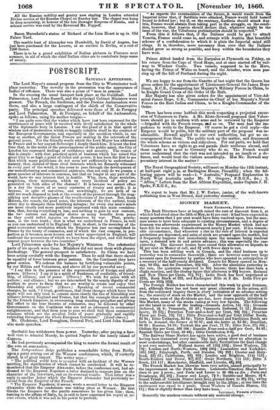cCaprera. , .kle had-previously accompanied the king to receive the
formal result of the vote on annexation.
The Independanee Beige publishes a remarkable letter from Berlin upon a point arising out of the Warsaw conferences, which, if correctly elated, is of great import. The writer says-
- " e political world here is occupied with Th an incident of the Warsaw
inekting, the sigilitleition of which cannot be overlooked. it will be re- Oduaribered thattho Emperor Alexander, before the conferenommet, had,ad- 'dressed to" the ,Einperor Napoleons letter destiaed te reassuteliim ,on the ,character of the interview? and on its eventual results. That letter was a reply to another letter which' the Emperor Alexander bad previously re- Caved from the Emperor of the French. " The Emperor /Napoleon it seems, wrote a second letter to the Emperor --Alexander while the conference was taking place at Warsaw. He first thanks the Emperor for the- pacific assurances he has given him ; then, twin to She alfairs of Itsrly„.he;ii said to have expressed his regret at re-
cent events, which it was not in his poiver to'preSrent. • " As regards the eventuahnes of the future, it would result from the Imperial letter that, if Sardinia were attacked, France would hold herself bound to defend her; but if, on the contrary, Sardinia should attack Aus - tria, France would abstain from taking part in the struggle, on the condi- tion, however, that Austria should declare that, whatever might be the issue of the war, the Villafranca preliminaries should be respected." From this it follows that if the Italians could be got to attack ,
Venetia, France could come in, and arrange with Austria that beautiful scheme of a confederation to which it is plain the Imperial mind still clings. It is, therefore, more necessary than ever that the Italians should grow as strong as possible, and keep within the boundaries they have won.


























 Previous page
Previous page